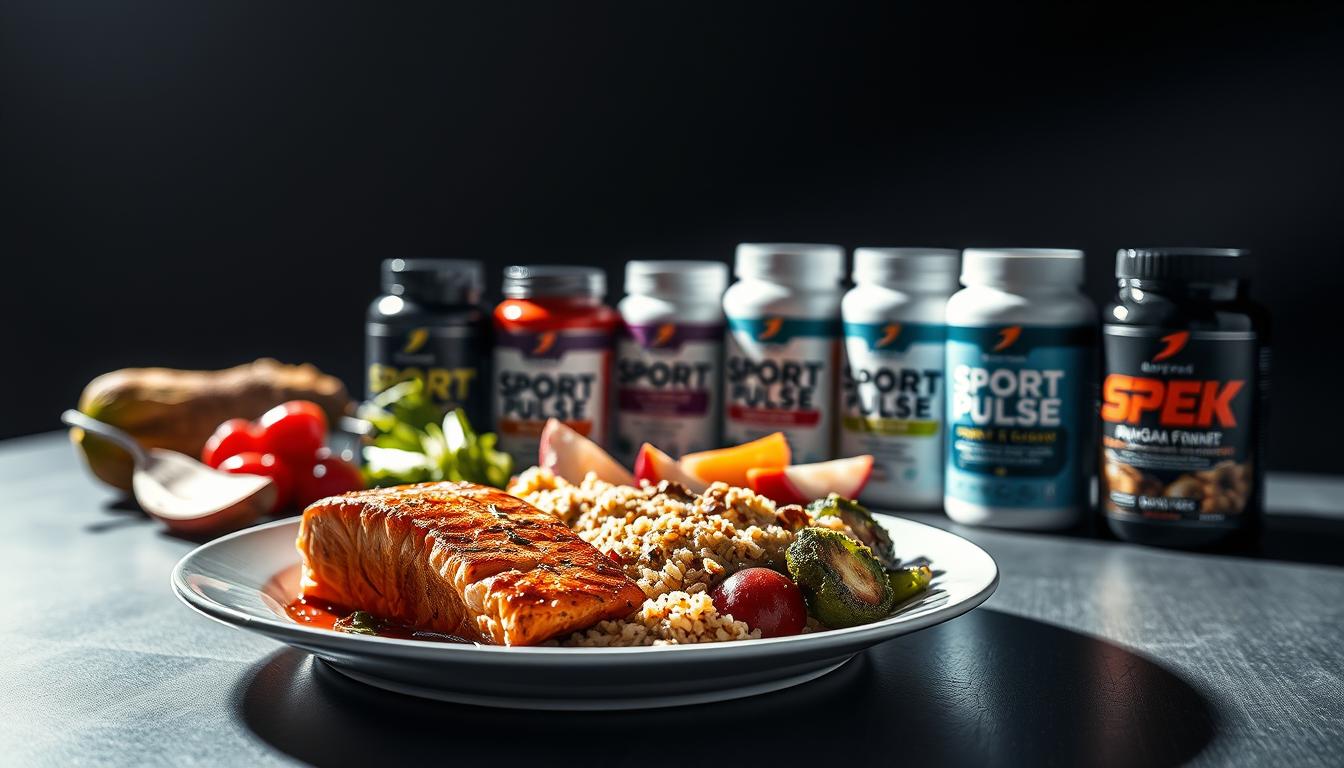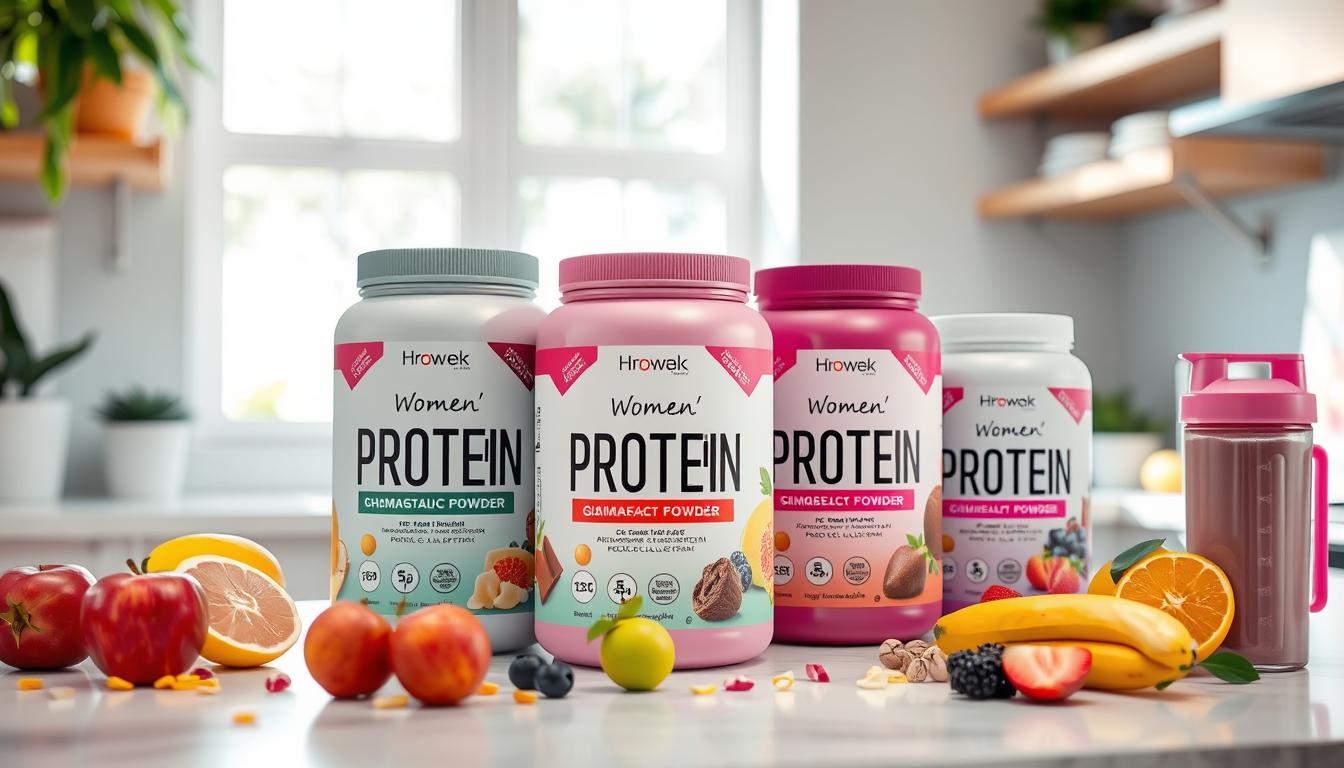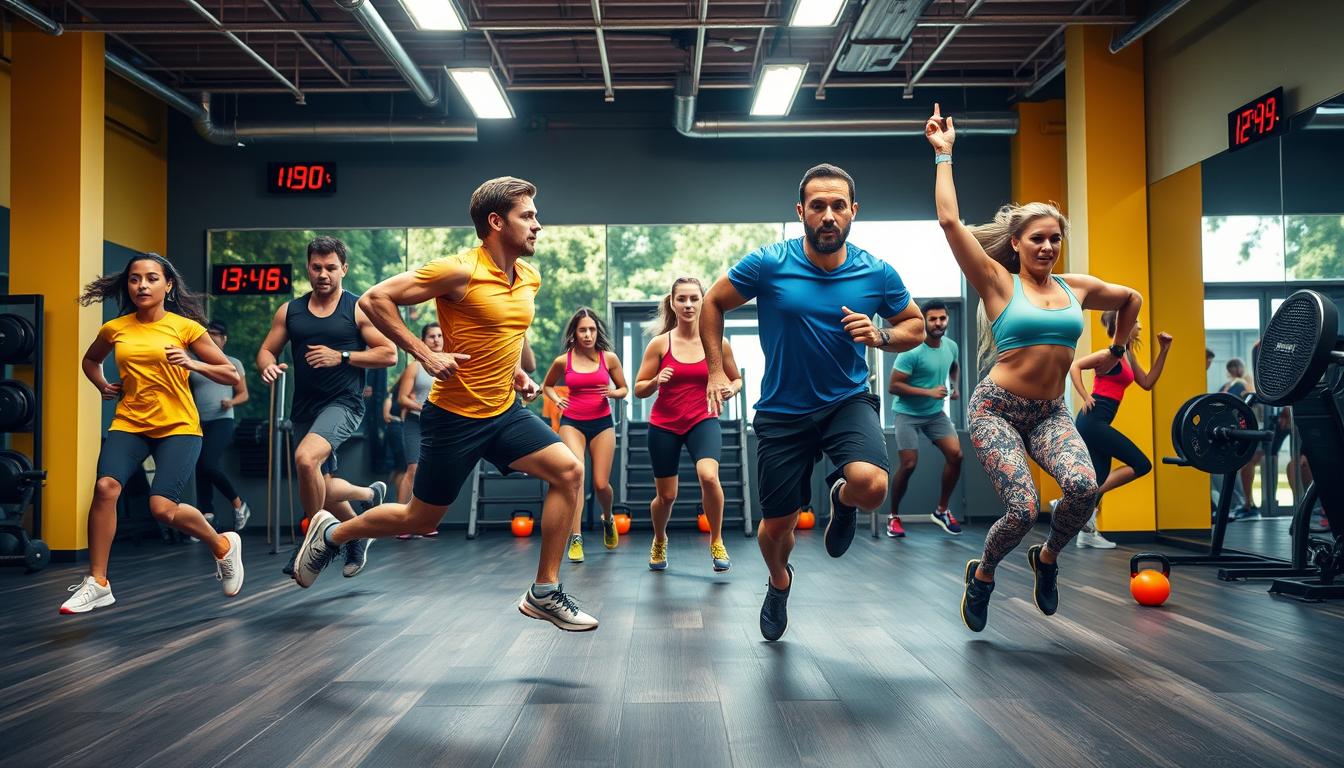Can the right nutrition really make a difference in an athlete’s performance? The answer is a big yes. Proper nutrition is key for top performance in training and competition.
We dive into the dietary secrets of elite athletes. We learn about their nutrition plans. A balanced diet with the right mix of nutrients is vital for peak performance. It helps with gaining muscle, losing fat, or keeping weight steady. Custom nutrition plans are essential.
Getting help from a sports dietitian can be very helpful. At Cowrit.com, we provide writing, marketing, and social media services. We help athletes and sports teams share their nutrition plans well.
Key Takeaways
- Proper nutrition is key for top athletic performance.
- Elite athletes need custom nutrition plans to meet their needs.
- A balanced diet with the right nutrients is vital.
- Working with a sports dietitian can help athletes improve their nutrition.
- Sharing nutrition plans well is important for athletes and sports teams.
Understanding the Importance of Nutrition for Athletes
The right nutrition is key for athletes to perform well and recover fast. Nutrition supports their performance and health in many ways.
The Role of Macronutrients
Macronutrients like carbs, proteins, and fats are vital. They give energy and help muscles grow and repair. Carbs are the main energy source for intense activities.
The amount of carbs needed varies based on training intensity. For light activity, 3 to 5 g per kilogram of body weight is needed. For intense training, it’s up to 8 to 12 g per kilogram. For more on pre-competition nutrition, check out Hopkins Medicine.
| Macronutrient | Function | Examples |
|---|---|---|
| Carbohydrates | Primary energy source | Whole grains, fruits, vegetables |
| Proteins | Muscle repair and growth | Lean meats, fish, eggs, dairy |
| Fats | Energy source, hormone regulation | Nuts, seeds, avocados, olive oil |
Micronutrients That Matter
Micronutrients like vitamins and minerals are also key. They help with energy, nerve function, and immune health. Getting enough of these is important for top performance and avoiding deficiencies.
Hydration: The Key to Performance
Hydration is just as important. It helps control body temperature and moves nutrients to cells. Staying hydrated is essential for keeping performance up and avoiding dehydration problems.
Athletes need a good sports nutrition plan. It should include the right mix of macronutrients, micronutrients, and hydration. By focusing on nutrition and fueling strategies, athletes can improve their performance and reach their goals.
Common Dietary Approaches Among Elite Athletes
Elite athletes try different diets to boost their performance and health. The diet they choose depends on their needs, sport type, and personal taste. Getting help from a sports dietitian can make their diet fit their unique needs.
Plant-Based Diets
Plant-based diets are popular among athletes. They offer high antioxidants and better heart health. These diets include fruits, veggies, whole grains, and legumes.
Benefits of Plant-Based Diets:
- High in antioxidants and fiber
- Can improve heart health
- May enhance recovery
Paleo and Ketogenic Options
Some athletes choose paleo or ketogenic diets for weight control and metabolic health. The paleo diet avoids grains and dairy, focusing on whole foods. The ketogenic diet is rich in fat, moderate in protein, and low in carbs.
| Diet | Key Features | Potential Benefits |
|---|---|---|
| Paleo | Excludes grains and dairy, focuses on whole foods | Weight loss, improved metabolic health |
| Ketogenic | High fat, moderate protein, low carbohydrates | Weight loss, improved energy |
Balanced Meal Plans
A balanced meal plan is vital for athletes to get all needed nutrients. It includes lean proteins, complex carbs, and healthy fats.
A well-balanced diet is key to supporting the high demands of athletic training.
For athletes, finding the right nutrition is key. Whether it’s plant-based, paleo, ketogenic, or balanced, the goal is to support peak performance and well-being.
Contact us for more info on tailoring a nutritional plan for your athletic needs: raja@cowrit.com.
Daily Meal Structure: When to Eat
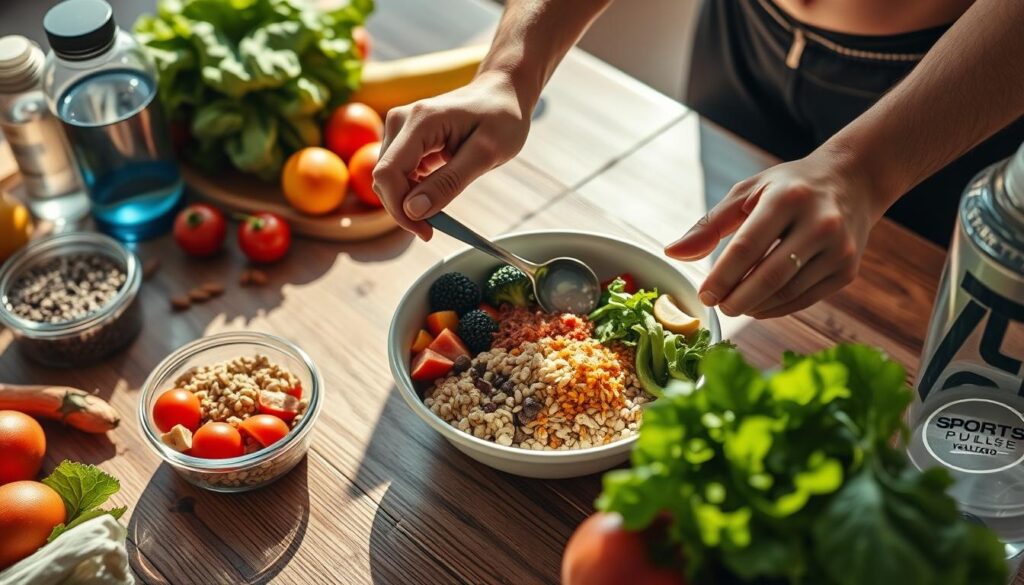
For elite athletes, when to eat is as important as what to eat. A good athletic performance diet means knowing the right times for meals.
Pre-Workout Nutrition
Before working out, eating the right food is key. Athletes should aim for a meal with complex carbs and protein 2-3 hours before. This meal is a big part of an athlete fueling strategy.
A meal of whole grain pasta, chicken, and steamed veggies is great. Don’t forget to drink lots of water too.
During Workout Fuel
During long or hard workouts, athletes need to refuel. Simple carbs like energy gels or bananas work well. It’s important to eat these at regular times to keep energy up.
| Fuel Type | Examples | Benefits |
|---|---|---|
| Energy Gels | Gu Chomps, Clif Shot | Quick, easily digestible carbohydrates |
| Sports Drinks | Gatorade, Powerade | Replenishes electrolytes, provides carbohydrates |
| Fruits | Bananas, Apples | Natural source of carbohydrates, easy to consume |
Post-Workout Recovery
After working out, eating the right food helps muscles heal and energy stores get back. Eating a mix of protein and carbs within 30-60 minutes is key. This is a big part of a sports nutrition plan.
For example, a recovery shake or a meal of grilled chicken and sweet potatoes works well. Some athletes also use top supplements for athletes like protein powders or BCAAs to help recover.
By planning meals carefully, athletes can improve their performance and recovery. It’s about finding the right balance and making smart choices for an athletic performance diet.
Supplements: What’s Worth Considering?
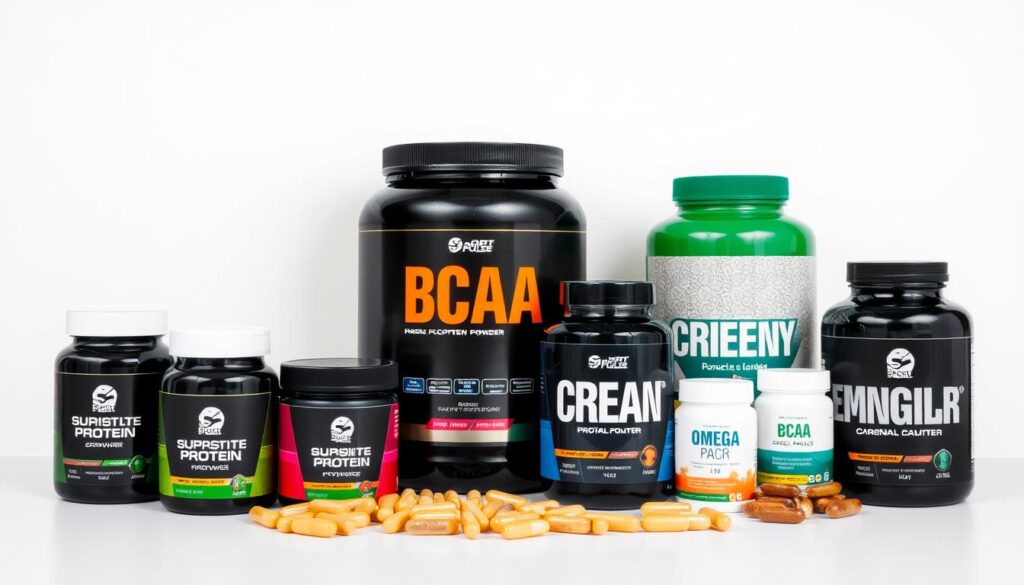
Many elite athletes use supplements to get the nutrients they need for top performance. It’s key to know what supplements are out there and how they can help in training.
Essential Vitamins and Minerals
Vitamins and minerals are vital for athletes, boosting health and performance. Iron helps move oxygen to muscles, and calcium keeps bones strong. Athletes should eat foods rich in these nutrients, but supplements can fill any gaps.
Some important vitamins and minerals for athletes include:
- Vitamin D for bone health and immune function
- Magnesium for muscle function and energy production
- Iron for oxygen transport and energy production
- Calcium for bone health
Popular Performance Enhancers
Performance enhancers are supplements that boost athletic performance. Creatine and protein powders are favorites for increasing strength, endurance, and recovery. Athletes should pick enhancers based on their needs and follow anti-doping rules.
| Supplement | Benefits | Considerations |
|---|---|---|
| Creatine | Enhances strength and endurance | May cause stomach cramps, diarrhea |
| Protein Powder | Supports muscle recovery and growth | Quality varies by brand, possible allergens |
| Branched-Chain Amino Acids (BCAAs) | Reduces muscle soreness, supports recovery | May interact with certain medications |
Natural vs. Synthetic Options
Athletes often choose between natural and synthetic supplements. Natural supplements come from whole foods and offer a holistic benefit. Synthetic supplements give a focused dose of nutrients. The choice depends on personal needs and preferences.
For advice on supplements and nutrition plans, reach out to us at raja@cowrit.com. We’re ready to help you optimize your nutrition for better performance.
The Impact of Meal Timing on Performance
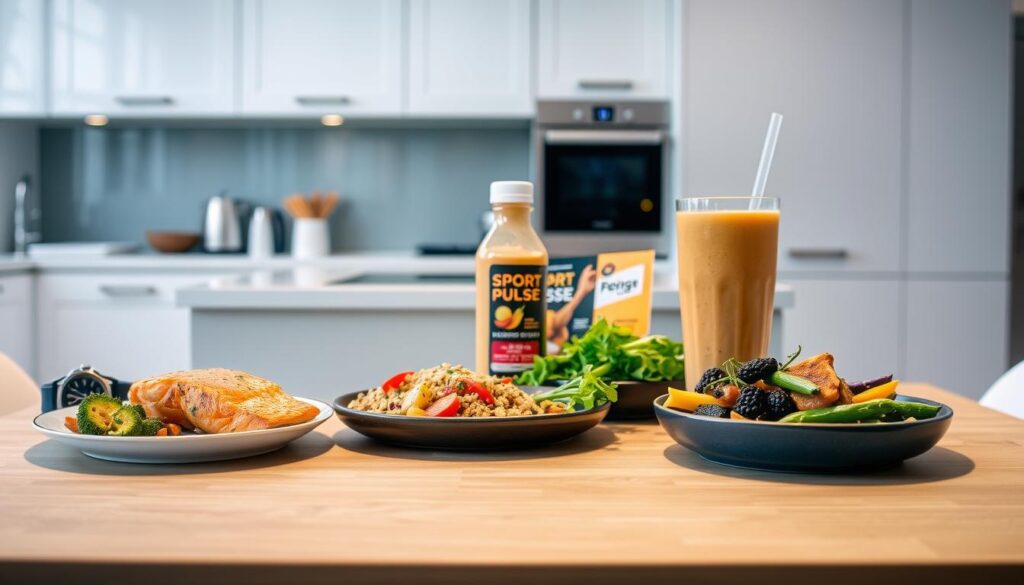
For athletes, timing meals is key to better performance and winning. Planning meals well can boost energy, aid in recovery, and improve overall athletic performance diet.
Knowing how nutrients affect the body at different times is important. Athletes can fine-tune their athlete fueling strategies to fit their needs.
Strategic Eating for Training Cycles
During training, athletes need a sports nutrition plan that supports their energy and helps with recovery. Eating the right foods at the right time boosts performance and reduces tiredness.
Eating a meal with carbs and protein 1-3 hours before training gives lasting energy. Drinking water or sports drinks during training keeps performance high.
Timing for Competitive Events
Before competitive events, meal timing is adjusted for peak performance nutrition. Carb-loading is a common method to fill glycogen stores.
Athletes should try different meal timing during training to find what works best. By perfecting their athlete fueling strategies, they can outperform and reach their goals.
Want to optimize your nutrition plan? Contact us at raja@cowrit.com for our content writing and digital marketing services.
Customizing Nutritional Plans for Individual Needs
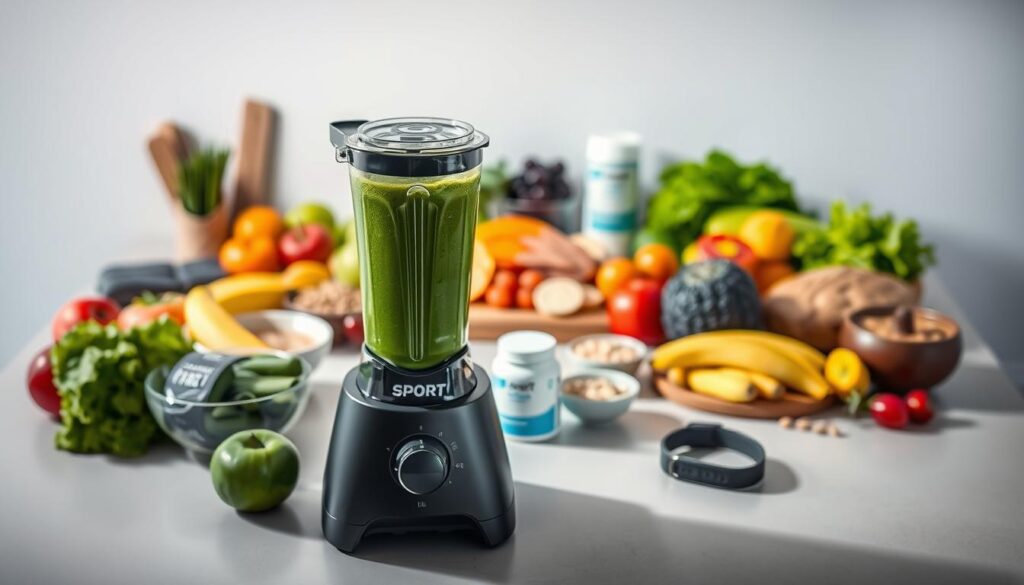
Athletes need a special diet to help them train and compete better. Each athlete is different, based on their sport, how hard they train, and their health goals.
Factors Affecting Dietary Choices
Many things affect what an athlete eats. These include:
- Type of Sport: Different sports need different foods. For example, runners need more carbs than sprinters.
- Training Intensity: Athletes who train hard need more calories and certain nutrients.
- Personal Health Goals: Athletes might want to lose weight or get healthier, which changes what they eat.
Knowing these factors is key to a good nutrition plan. A good diet can really help an athlete perform better and recover faster (PMC10848936).
Working with Nutritionists
Getting help from a sports nutritionist is very helpful. They can make a diet plan just for you. They’ll help with meal planning, supplements, and staying hydrated.
Some benefits of working with a nutritionist are:
- Personalized Nutrition Plans: They make a diet plan just for you, based on your needs and goals.
- Optimized Performance: Eating the right foods can help you perform better and get ahead of your competitors.
- Improved Recovery: A good diet can also help you recover faster after working out or competing.
Want to know more about making a diet plan just for you? Contact us at raja@cowrit.com to learn about our writing and marketing services.
Addressing Common Myths About Athletic Nutrition
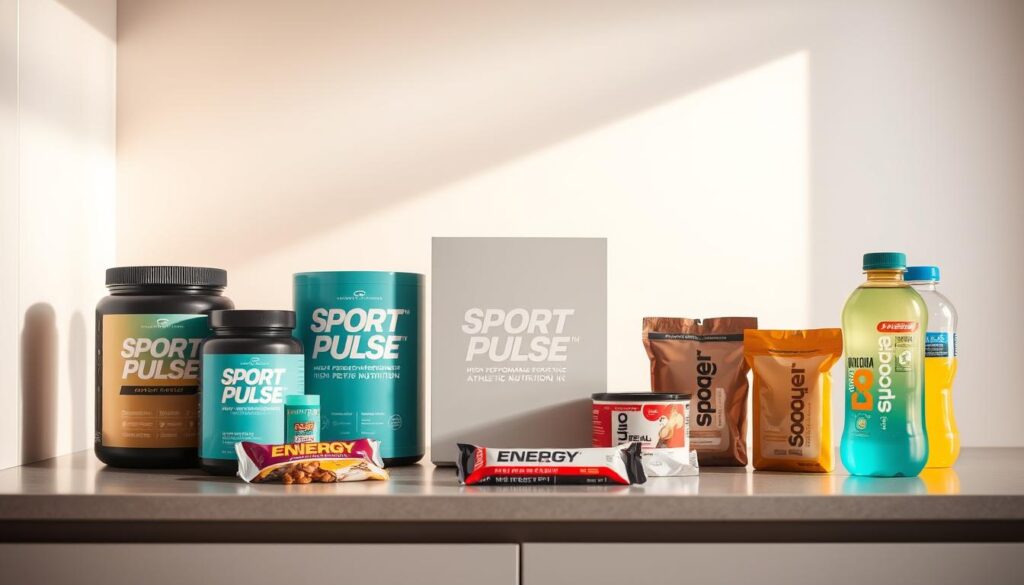
It’s key for athletes to know the truth about athletic nutrition for peak performance nutrition. Misunderstandings about food and supplements can hurt performance.
Nutrition for athletes is complex, and myths can confuse. For example, many get protein and carbs wrong in their athletic performance diet. Let’s look at some myths and the facts.
Dispelling Protein Myths
Protein is vital for muscle repair and recovery in athletes. But, more protein doesn’t always mean more muscle. Studies show there’s a best amount of protein for muscle growth.
Athletes should eat high-quality proteins as part of a balanced sports nutrition plan. The right amount depends on the sport, training, and goals. Athletes need 1.2 to 2.0 grams of protein per kilogram of body weight each day.
Carbohydrate Confusion
Carbs are key for energy in an athlete’s diet. But, cutting carbs too much is a myth. What and when you eat carbs matters more than how much.
Whole grains, fruits, and veggies give lasting energy and are full of fiber and nutrients. Athletes should eat carbs before and after workouts for best results. For extra nutrition, some top supplements for athletes can help.
For a custom nutrition plan, athletes can talk to sports nutrition experts. They can create a plan that meets your specific needs and goals.
If you need help with content or digital marketing, contact us at raja@cowrit.com.
Recovery Meals: What Should We Consume?
Recovery meals are key for athletes wanting to boost their performance. They help fix muscles and refill energy. “Proper nutrition after exercise is vital for recovery,” as it lessens muscle soreness and boosts future performance.
Importance of Recovery Nutrition
Recovery nutrition is a big part of athlete fueling strategies. It’s key for our bodies to bounce back from exercise. Eating the right mix of protein and carbs soon after exercise helps a lot. Protein fixes muscles, and carbs fill up glycogen stores.
For a peak performance nutrition plan, recovery meals should match the athlete’s needs. For example, after a tough workout, a mix of protein and carbs is best. Greek yogurt with berries or a protein shake with a banana are good choices.
Quick and Effective Recovery Foods
For athletic performance diet, quick and effective recovery foods are great. Some top picks include:
- Greek yogurt with berries
- A protein shake with a banana
- Turkey and avocado wrap
- Chocolate milk
These foods are easy to grab and give the right nutrients for recovery. Chocolate milk, for instance, is great for refilling energy and fixing muscles because of its perfect carb and protein mix.
In high-performance sports nutrition, knowing about recovery meals is essential. By choosing the right recovery foods, we can get better, perform better, and reach our athletic goals faster.
Conclusion: Finding What Works Best for Us
Exploring elite athlete diets shows that a one-size-fits-all approach doesn’t work. Each athlete is different, and what works for one may not work for another. It’s key to create a personalized sports nutrition plan to reach our athletic goals.
Nutritional Personalization
Personalizing our nutrition means understanding our unique needs and preferences. Working with sports nutrition experts helps us craft a diet that boosts our performance and health.
Embracing the Process
Finding the right athlete fueling strategies takes time and patience. It’s about building lasting eating habits for long-term success, not quick fixes. Peak performance nutrition is a journey, not a destination.
Sustainable Habits
Focus on whole foods and balanced meals to fuel your best performance. For more on creating a personalized sports nutrition plan, contact us at raja@cowrit.com. Learn how our services can help you reach your athletic goals.
